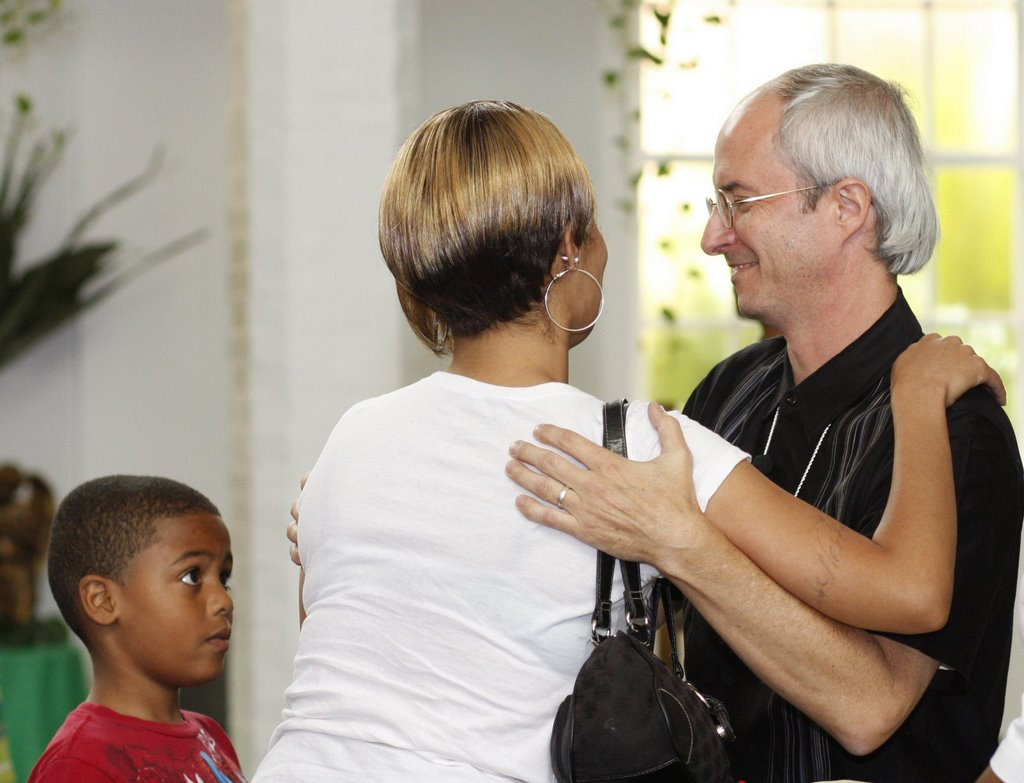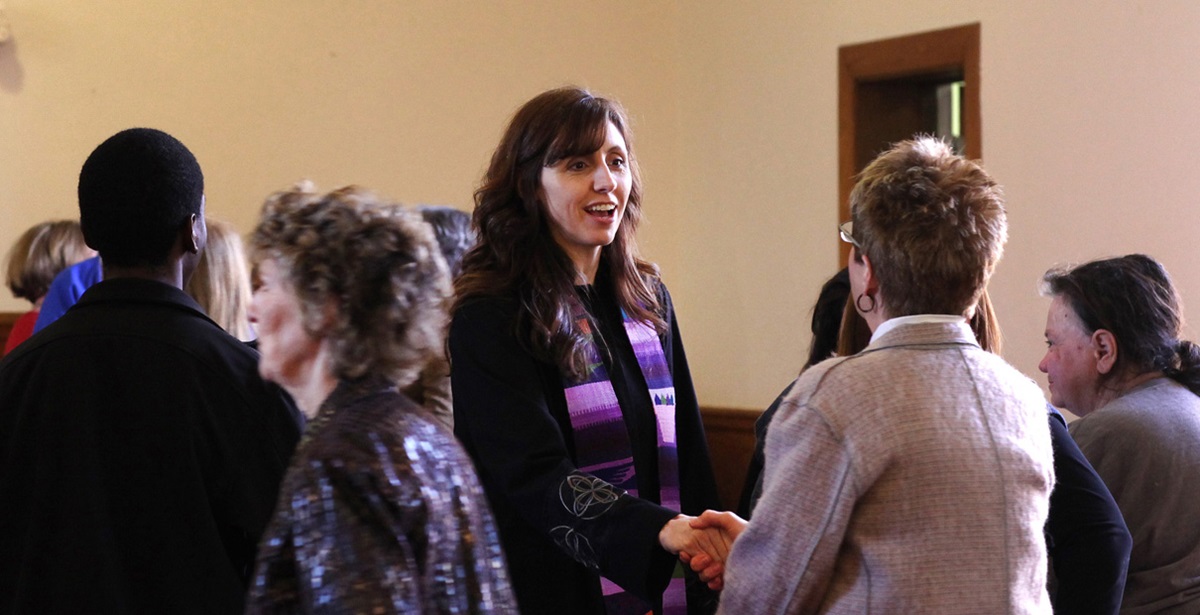For many United Methodists, evangelism is an uneasy word.
It conjures images of someone on a busy street corner handing out Bible tracts or perhaps a missionary on the doorstep interrupting an already-hectic Saturday morning.
Neither situation is necessarily Wesleyan, explained the Rev. Heather Heinzman Lear, the director of evangelism ministries for the United Methodist Board of Discipleship. Lear has made it her mission to give United Methodists a new vantage point on evangelism — as an essential part of Christian discipleship.
Evangelism resources
- Evangelism resources from the United Methodist Board of Discipleship
-
“Vital: Churches Changing Communities and the World” by Jorge Acevedo
-
“Shift: Helping Congregations Back into the Game of Effective Ministry” by Phil Maynard
-
“Real Life: A Christianity Worth Living Out” by James Choung
-
“Should We Change Our Game Plan? From Traditional or Contemporary to Missional and Strategic” by George G. Hunter III
-
“Nudge: Awakening Each Other to the God Who’s Already There” by Leonard Sweet
-
From United Methodist Communications, how to become a certified welcoming congregation
Evangelism should not just be about providing a form of fire insurance “to keep people out of hell,” she said. “Jesus came to teach us how to live and to announce the Kingdom of God is at hand.”
To truly share and live out that good news, Lear said, requires developing relationships with people. That often requires more than handing out Bible tracts.
Lear said she wants to help United Methodists reclaim the definition of evangelism as communicating the good news of Christ’s life, death and resurrection — that in the words of the Gospel of John: “The Word became flesh and made his home among us.”
Lear was addressing more than 50 United Methodist lay people and clergy, including a district superintendent, from around the Memphis Annual (regional) Conference. They had given up a chunk of their Saturday, March 1, to attend Lear’s workshop “Reclaiming Evangelism” at Mullins United Methodist Church in Memphis.
She said she also wants United Methodists “to reclaim the centrality of evangelism in the life of our churches.”
A Wesleyan approach to evangelism, she said, should combine three aspects:
- Apologetics, teaching people Christian beliefs
- Personal transformation, helping people grow in their relationship with Christ
- Mission, enabling people to share Christ’s love with others
How do churches go about integrating all three?
Lear drew on the book “Shift: Helping Congregations Back into the Game of Effective Ministry” by the Rev. Phil Maynard, a clergy coach who works with Path1, the United Methodist Board of Discipleship new church starts division.
She presented five changes the book recommends that will help congregations more effectively share the gospel and help develop more Christian disciples.
From fellowship to hospitality
“Are we friendly, or are we in the practice of making friends?” Lear asked. “There’s a huge difference.”
DISCUSSION QUESTIONS TO RETHINK OUTREACH
1) How is your church known in your community? Is it known?
2) If your church was to be destroyed in a tornado tonight, would it be missed? Why or why not?
Congregations usually are great about sharing friendly fellowship among current members. But at some churches, newcomers can feel like an outsider at a family reunion rather than a welcome addition to a community of faith, Lear and others at the workshop observed.
Many churches can seem to have assigned seating — with people insisting on sitting in the same place in the same pew every Sunday. But that tendency can also be an evangelism tool, Lear said.
She suggests telling congregants that their pews are their “mission field.” “You need to know the people who sit all around that pew,” she said. “You need to be aware who’s there and who’s not. When somebody new comes in, get their name.”
One man at the workshop said that when he visited a church, it was his pew neighbors who helped get him and his wife connected with the church choir and find a Sunday school class. Because of them, he and his wife became members.
From worship as an event to worship as a lifestyle
Lear challenged her listeners to think of how they can take their worship experience out into the world and help people “encounter the risen Lord” outside the church sanctuary.
She quoted Louis Giglio, pastor of Passion City Church in Atlanta and author of “The Air I Breathe: Worship as a Way of Life.” “You are and always will be a worshiper,” Giglio wrote. “It’s what you do. You can’t help it. You can’t stop it. But you can choose where you invest it.”
The Rev. Cynthia Davis, McKendree District superintendent in the Memphis Conference, said she urges churchgoers not to toss their worship bulletins into a recycling bin after service but instead give them away between Sundays.
“If you have Scriptures and prayers and liturgy, it might be helpful to someone else on their journey,” Davis said. “You never know who might need that word from the Lord.”
On the United Methodist Board of Discipleship website, Lear also offers invitations to discipleship that churches can use each week to help worshipers reflect more on the week’s Scripture reading and keep their focus on God during the week ahead.
From ‘serve us’ to service
Even congregations with strong community outreach can struggle to help people make the connection between love of neighbor and the worship of God.
“We have people who use our church gym every night who don’t know where the sanctuary is,” Carla Taylor, director of communications at St. Luke’s United Methodist Church in Memphis, said to those at the event. Taylor is also chair of the Memphis Conference Communications Action Team.
Lear suggested one way to bridge that gap is to help everyone in the church know that the task of sharing the Christian faith isn’t just the job of the pastor or the evangelism chair but a calling on every Christian.
“I would argue that everything that goes on in church buildings and with our church’s name on it should be about sharing the love of God with others and growing in the love of God ourselves,” she said. “Everything that our church is about should have an evangelistic lens.”
From a survival mentality to generosity
Lear says she often receives calls from church leaders who say their church needs more people, otherwise the church can’t pay its bills.
“Money follows ministry,” Lear said. “People aren’t really excited about paying me or paying for the lights. But if we are doing significant ministry, it will make a difference.”
She also pointed out generosity includes far more than the dollars in the offering plate. After all, United Methodist membership vows call on people to pledge their time, talents and witness as well.
She suggested one way churches can publicly acknowledge the varied forms of generosity — and get away from the mentality of scarcity — is to get rid of that old bulletin standby of printing the total budget, year-to-date and the current deficit.
Instead, she said bulletins, church newsletters and even worship should include stories of how the church’s ministries are making differences in people’s lives. “If you tell the stories of people’s lives being changed, people want to be part of that.”
From membership to discipleship
Membership focuses on what happens inside the church walls but discipleship transcends them and engages the world, Lear said.
But many people struggle with sharing their faith story, especially if they grew up in the church.
She suggested an exercise to overcome that discomfort. “Take a sheet of paper and draw a line across from birth to today and then draw the peaks and valleys of when did I feel God really present in my life and when did I feel really alone,” she said. That way when someone at work or in the neighborhood is struggling, United Methodists can share how God reached out to them during a low point.
“The good news is that we have a God who loves us so much that he decided to be in unity with us and join in the human experience even including his death on the Cross,” Lear said. “That’s not something you find in other religions.”
And the news is so good, Christians have every reason to invite others to share in it.
Editor's Note: This story was first published on March 7, 2014.
*Hahn is a multimedia news reporter for United Methodist News Service. Contact her at (615) 742-5470 or newsdesk@umcom.org.
Like what you're reading? Support the ministry of UM News! Your support ensures the latest denominational news, dynamic stories and informative articles will continue to connect our global community. Make a tax-deductible donation at ResourceUMC.org/GiveUMCom.





